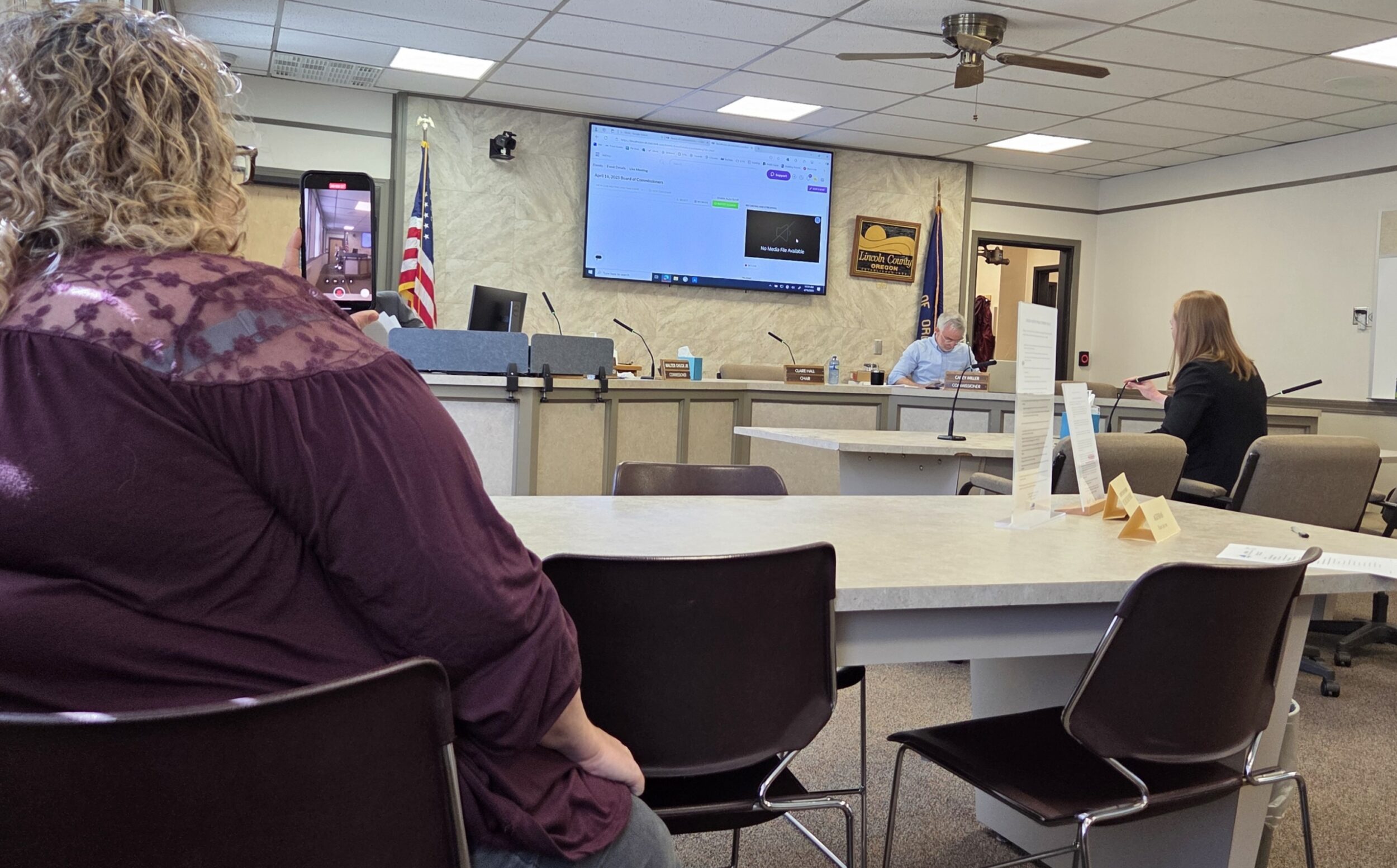
By QUINTON SMITH and SHAYLA ESCUDERO/Lincoln Chronicle
Months of back-and-forth public conflict between Lincoln County’s district attorney, a commissioner and the county’s attorney has hit a new level with accusations of corruption by one side and calls for a state investigation by the other.
Following an abruptly adjourned commissioners meeting last week, district attorney Jenna Wallace leveled accusations of misconduct, retaliation and a refusal to order an outside investigation of the county’s lawyer and human resources director.
After Wallace released her statement, commission chair Claire Hall issued an opposing message to say that Wallace was retaliating after the county reported her behavior to two state agencies.
The deepening dispute between administrators and department heads comes after months of disagreement, an exodus of leaders and staff and a growing stack of lawsuits and complaints.
The dispute between Wallace, Hall and county counsel Kristin Yuille broke into public once again when Hall ended a commission meeting after the head of the county’s employee union criticized her during a public comment period. Yuille ordered the meetings’ audio and video turned off and directed commissioners and staff to leave the room, stating that collective bargaining disagreements shouldn’t be discussed in public.
Wallace was in the audience and planned to speak for the allotted three minutes. Still, the first-term district attorney took a seat at a dead microphone and read a six paragraph statement to commissioner Casey Miller, who stayed and recorded it after Hall and commissioner Walter Chuck left.
Wallace accused the county of not following its personnel rules, ignoring her requests to have an outside investigation of her complaints against Yuille and human resources director David Collier, and refusing Miller’s repeated requests for the commission to schedule an executive (closed) session to discuss those issues.
“Why is the Board of Commissioners refusing to follow its own personnel rules? Why is the BOC refusing to initiate an outside investigation into Yuille and Collier?” Wallace said in her statement. “Are you afraid of what might be uncovered if Yuille and Collier were investigated by an unbiased individual? Would it implicate you in the process? Or are you afraid of the power Yuille and Collier possess to isolate you, mistreat you, and gaslight you? Why are you protecting Yuille and Collier at the expense of your employees? Are you at all aware that county counsel and human resources have been weaponized to silence and retaliate against those who challenge their decisions or speak out against them?”
Wallace later posted her statement with a similar but longer one from March on the district attorney’s web page and social media.

That prompted Hall to respond with her own news release, saying the district attorney’s allegations were false. Without providing details, Hall also said Wallace was attacking she and Yuille after they contacted the Oregon Department of Justice and the Oregon Department of Public Safety Standards and Training with allegations of unethical behavior.
“The district attorney’s allegations are false and an attempt at retaliation against county leadership for raising ethical violations and to stop pending investigations regarding misconduct within her office,” Hall said in her statement. “The DA believes she is above the law and has displayed a pattern of making false accusations in order to avoid accountability.”
In response to a question from the Lincoln Chronicle on Thursday, the county said there is “no basis for an outside investigation for decisions simply because they are opposite of the personal interests of the district attorney and/or because the district attorney disagrees with those decisions.”
The very public fight between Wallace, Hall and Yuille comes after months of disorganization, contentiousness and disagreement in the commissioners’ offices that now is drawing in department leaders.

Past conflicts
Sitting in a coffee shop, laptop open and surrounded by piles of notes, Miller gives a short tour of his “remote office.”

He’s worked on county business from home and public spaces since he was barred from working at courthouse offices. It’s the seventh month of a plan directed by Collier after Miller was investigated for releasing confidential information about county administrator Tim Johnson and allegations by two employees of bullying and creating a toxic work environment during a Sept. 18 commission meeting. The investigation by a Portland law firm and overseen by Yuille’s office, concluded Miller did release confidential information but did not create a toxic workplace.
Amid the contention, Johnson resigned in early February after growing dissatisfaction with his work and commissioner Kaety Jacobson quit in frustration in mid-February in the middle of her second, four-year term. That left the county in the hands of two commissioners who now distrusted each other until they appointed Chuck a month later. Chuck has so far stayed silent about the controversies
On Feb. 26, Miller filed a tort claim notice with the county, usually a precursor to a lawsuit, that said he might sue for whistleblower retaliation, intentional infliction of emotional distress, and any other violations “that may come to light as this case progresses.”
Since September, Miller has clashed with Yuille, begun to side with Wallace’s on her issues, and has repeatedly requested work or executive sessions to discuss legal, personnel and organizational issues. Miller says his requests have been met with silence.
On Thursday, the county said Miller’s requests for executive sessions were for reasons that are not permitted under the law such as “holding an executive session to discuss executive sessions.”
Other requests such as discussion of a personnel matter, the county said, Miller has “not provided information when asked in order for the county to comply with requirements.”
“Under public meetings law, we are required to provide notice of an executive session and provide notice to an individual who is the subject of the personnel discussion because they may request an open session,” the county said in its statement.
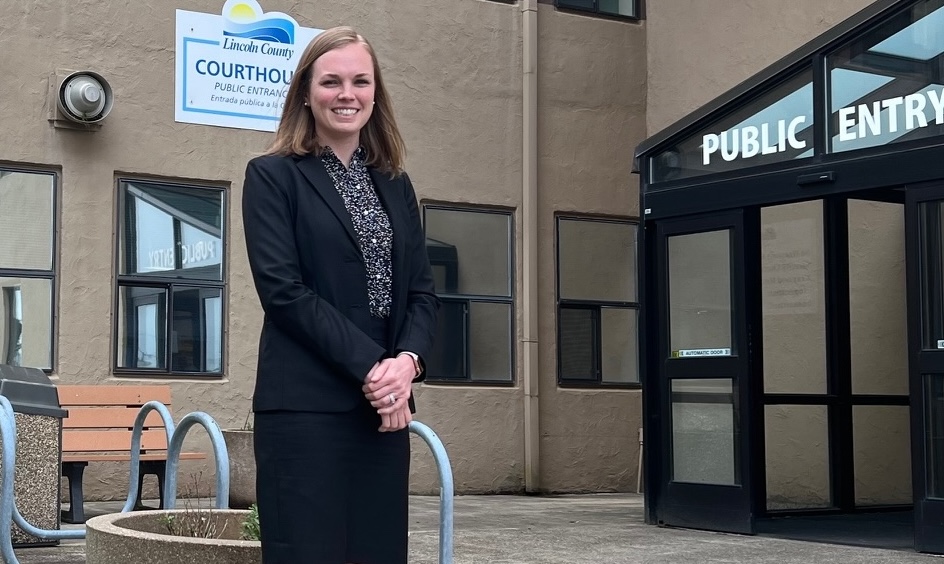
The DA’s office
Wallace’s 10 months as district attorney has also been anything but smooth.
Wallace, 35, had been chief deputy for embattled district attorney Lanee Danford for just nine months when Danford decided in March 2024 to not seek re-election in last May’s primary. Wallace jumped into the race, handily beat a longtime Newport defense attorney and was appointed to the office two months later by Gov. Tina Kotek.
But by that time, all but one of the office’s eight deputy district attorneys had left, forcing the Oregon Department of Justice to step in to help. Wallace has now filled seven of the eight deputy positions – its budget authorizes 10 — but is still trying to recruit a chief deputy to help run to 30-member department.
By most accounts Wallace initially tried to improve dealings with commissioners, who were often embroiled in personnel, budget issues and lawsuits with Danforth. But that went south last September as a work group setting up a state-mandated drug deflection program disintegrated over which office should house its coordinator.
Wallace, then-Sheriff Curtis Landers and presiding circuit judge Sheryl Bachart advocated for the position to be part of the district attorney’s office.
But on Sept. 3 the three claim Yuille told the work group that Hall and Jacobson – a majority of the three-member board — had decided to put the coordinator’s position in the county’s parole and probation office.
Miller, who was the commission’s liaison to the group, said he never heard about that. Jacobson later said in emails that she did not tell Yuille that, but only that she wanted the county administrator to help sort out the best place for the position.
That led to an explosive commission meeting Sept. 18 when Miller – who was commission chair at the time — read a 30-minute statement laying out a litany of issues he felt commissioners were not addressing and topics he had been unable to get placed on agendas. Those included unsuccessful attempts to evaluate Johnson, concerns about the drug deflection program, possible open meetings law violations, and Yuille’s role in administrative procedures during Johnson’s absences over the summer.
The husband issues
Underlying much of Hall, Yuille and Collier’s issues with Wallace has been her continued advocacy for positions in her office that her husband could fill.
Orrin Wallace carries some issues of his own that county officials have indicated should disqualify him from higher-level investigatory jobs.

Wallace was hired as a police officer in Coquille in 2013 after two years as an officer in Warm Springs and deputy in Jefferson County. He resigned his position in Coquille in 2020 as part of a settlement agreement after investigators for the state Department of Public Safety Standards and Training determined that he lied to them about inflammatory conversations with a city of Coquille budget committee member over a host of issues involving the city and its police department.
In its report, agency staff wrote that “Wallace’s untruthfulness during investigations and conduct violates the board’s moral fitness standards.”
But in July 2021, the board’s police policy committee voted 11-2 to not revoke Wallace’s state certifications saying there were mitigating circumstances with Wallace and a culture of dysfunction in the Coquille department.
Danforth hired Jenna Wallace, who had been working in Lane County, as a deputy district attorney in March 2022 and then five months later hired Orrin Wallace as a detective.
After Wallace was appointed district attorney she sought advice on conflicts of interest involving her husband from the Oregon Government Ethics Commission. It advised Wallace that under the county’s nepotism policy she should declare a potential conflict of interest and have someone else in her office oversee her husband’s work.
Wallace wrote that declaration shortly after taking office last June and designated an interim chief deputy district attorney and then later her executive chief, Ellen Branford, to oversee of her husband.
Orrin Wallace was laid off as a detective last September when a grant expired and detective Martin Bennett used seniority to “bump” Wallace from the position into a legal assistant’s position, which has a substantially lower salary.
Bennett retired in January, the detective job was posted for internal candidates, and Wallace applied but was not selected. The job is now being advertised statewide.
The county employee’s union has filed grievances on decisions made during that process and also on the reclassification of a digital forensics detective in the district attorney’s office that Jenna Wallace believes her husband is qualified to hold.
Over Jenna Wallace’s objections, Collier placed Branford on administrative leave in late January after Collier said the head of the union informed the human resources department that Orrin Wallace was performing detective duties.
In early February, Jenna Wallace updated her conflict of interest statement saying in Branford’s absence she had designated to Miller “all personnel matters related to Mr. Wallace, including but not limited to hiring authority.”
Late that same month, Jenna Wallace stepped in with a formal appeal to commissioners that they reverse Collier’s decision denying her office’s request that her husband be returned to the detective position.
Throughout emails, letters and other documents provided by the district attorney to Lincoln Chronicle, Wallace accuses Collier of overstepping his authority to place someone in her office on administrative leave, violating the county’s personnel policies, and even ordering the surveillance of sensitive emails between her staff that contained investigatory records.
In a Feb. 25 complaint to Hall, Wallace also accused Collier of providing false information and lacking authority – saying it was her job — to send the Department of Public Safety Standards and Training information regarding Bennett’s retirement and departure from the county.
“This behavior appears to be primarily motivated to harm the integral functioning of my office and is retaliatory after I previously raised concerns in December 2024 regarding Ms. Yuille’s dishonesty and Mr. Collier’s cover-up of the behavior,” Wallace wrote.
Wallace said none of her allegations have been investigated. “Instead, Mr. Collier advised if I continue to raise concerns, I would be investigated, which appears to be an attempt to silence my concerns through intimidation and threats.”
Collier, in turn, has continually raised concerns with Wallace becoming involved with issues involving her husband and what he and Yuille considered “bullying” behavior in some meetings or towards staff asked to examine her office’s emails.
“… I understand that raising ethical issues such as nepotism with you can be uncomfortable, but the county has an obligation to ensure it’s following the law,” Collier wrote in an email following the deflection work group meeting law Sept. 3. “It appears you are targeting Counsel Yuille for raising these concerns.”
Collier said he thought Wallace’s behavior at the September meeting was “aggressive and bullying” toward Yuille and that his email served as “notice that the county will not tolerate treatment of staff in this manner.”
In late December, an attorney for Orrin Wallace also filed a tort claim notice that Wallace might seek damages for employment discrimination, whistleblower retaliation, workers’ compensation retaliation, intentional infliction of emotional distress, wage violations, and/or wrongful termination.
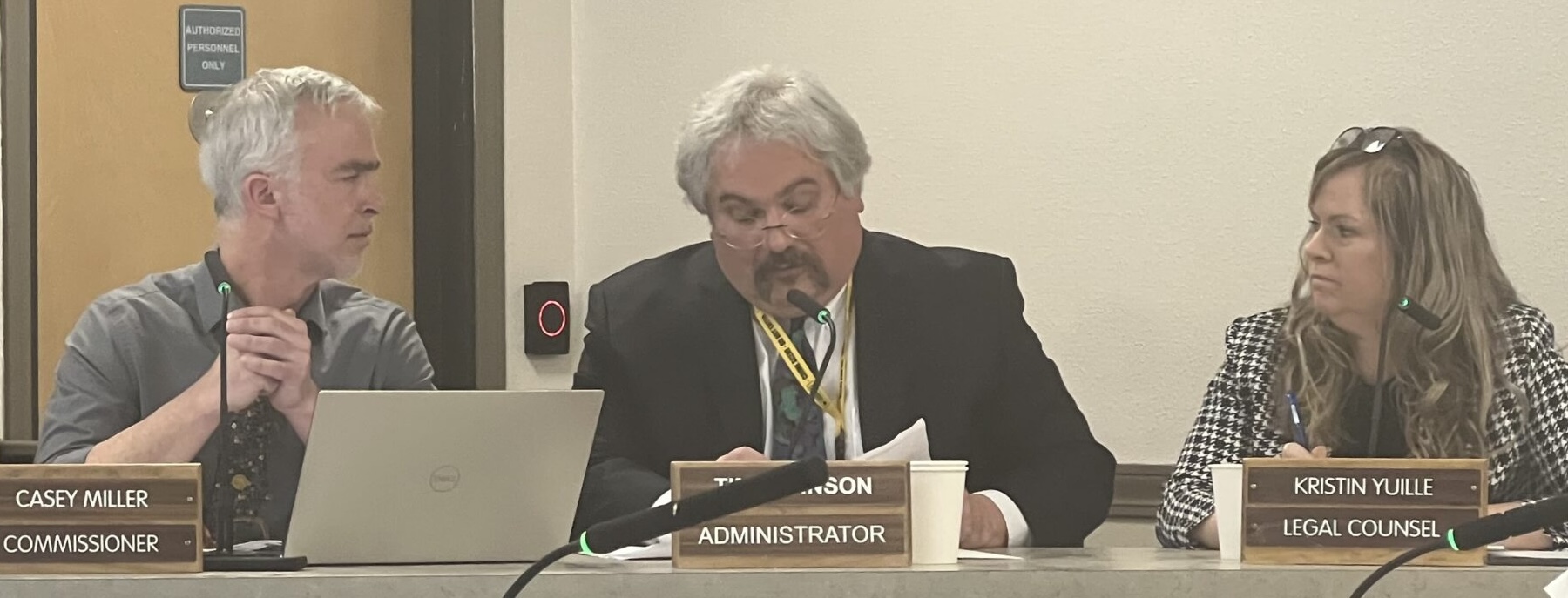
Oregon State Bar gets involved
In January, Wallace filed a complaint with the Oregon State Bar – the governing and rule making body for attorneys — that accuses Yuille of dishonesty involving her decisions over the deflection coordinator position and that they violated the bar’s rules on professional conduct.
The complaint has drawn in former sheriff Landers, who supported Wallace, and health and human resources department head Jayne Romero, who did not.
In letters to the state bar in December and again in March after he retired, Landers said while the Sept. 3 meeting was contentious, it was clear from administrator Johnson that no decision had been made “as Ms. Yuille described.”
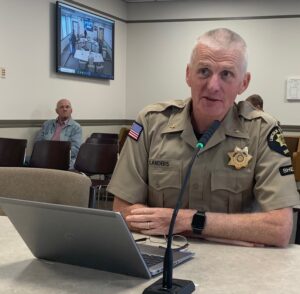
“I have known Ms. Yuille for years and this was not the first time she interrupted conversations or misrepresented information to advance her position,” Landers wrote in his March letter to the bar. Later in his four-page letter, Landers said eventual results from the meeting and follow-up conversations “clearly indicate that Ms. Yuille was untruthful in her statements and actions, which appear to have been influenced by personal bias against district attorney Wallace.”
“This is not the first time that Ms. Yuille has created an environment of misinformation and disruption to further her personal agenda …” Landers wrote.
Collier and Romero had a different take when they wrote letters to the state bar in support of Yuille.
At the Sept. 3 meeting, Collier said Wallace “also interrupted and belittled Counsel Yuille when she spoke, which I found to be bullying behavior.” He repeated his earlier comments that Wallace “seems to take exception” to Yuille raising ethical and nepotism issues and “appears to be targeting Counsel Yuille for raising these concerns.”
In her letter to the bar, Romero said Orrin Wallace was one of two finalists for a new health department position of chief medicolegal investigator, who looks into suspicious or unattended deaths. Wallace had been temporarily performing some of those duties in the district attorney’s office in addition to his detective work, Romero said.
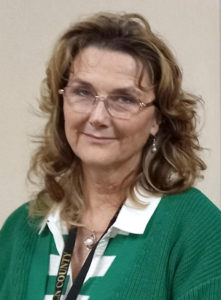
But Romero said when a more experienced and qualified candidate was selected for the position, Jenna Wallace put up roadblocks for the new investigator to do the job. Romero said she wrote Wallace saying she was inappropriately blocking the new investigator in order to keep her husband in the job. That was followed by what Romero termed “a very contentious call” between Wallace, the county’s medical examiner, two Department of Justice attorneys, a health department supervisor and Yuille.
“At one point during the conversation, the medical examiner was so frustrated with Ms. Wallace’s behavior he said ‘I quit’ and he hung up,” Romero wrote.
Wallace later met with the new investigator, Romero wrote, and agreed to approve her hire.
In her reply to Wallace’s bar complaint, Yuille said county officials have repeatedly raised nepotism concerns about involvement in personnel decisions involving her husband, including “that it appeared DA Wallace wanted to create a deflection coordinator position for her spouse.”
Yuille’s response letter went meticulously through the deflection group’s timeline and work, the coordinator decision, and disputed Wallace’s and Lander’s contention that she had unilaterally made the decision where to put the position. Yuille also said she and Collier also had to admonish Wallace during the Sept. 3 meeting to not bring up the subject of the digital forensic analyst position because her husband had filed a grievance about the job.
At the end of her letter Yuille said Jenna Wallace has behaved unprofessionally toward her.
“I have been an attorney for nearly two decades, and I have never experienced this type of unprofessional behavior from another attorney,” Yuille wrote. “I believe the motivation for her behavior is related to the issues with her involvement in personnel matters with her spouse, and her view that I am an obstacle in my representation of the county.”
In a March 24 rebuttal letter to the bar, Wallace said Yuille, Collier and Romero are trying to attack her credibility “by providing generalized statements and deceiving information insinuating that I have engaged in unethical nepotism behavior” and that Yuille “continues to be dishonest and misrepresent facts …”
Wallace told the bar that her husband “has not once shown interest in the deflection coordinator position …”
“It is both misleading, false and inflammatory to assert that I was attempting to create a position for my husband when that decision was already in place prior to my participation in the planning of the deflection program,” Wallace wrote, accusing Yuille misrepresenting facts “to deflect from her own conduct.”

Abrupt ending
About a dozen county employees were in the audience when last week’s commission meeting was cut short.
After a discussion about the role Hall had taken up in the absence of a county administrator, union leader Debbie Howard came forward with concerns about how “decisions have been handed down to LCEA have all been coming from one commissioner.”
She believed the current process violated collective bargaining agreements.
Yuille jumped in to caution that they were getting into collective bargaining issues which shouldn’t be discussed during a public meeting. Hall adjourned the meeting, leaving with Chuck. Miller stayed behind, helping Wallace record her statement calling for an outside investigation of Yuille and Collier.
After Wallace made her statement, Miller addressed the remaining employees upset with not being able to voice their concerns. Miller said he also felt like his attempts to discuss some issues have been fruitless.
“I guess, as you can see from this experience today, it doesn’t feel to me like I’m in an environment that’s open. To curiosity and problem solving, which is definitely a difficult position to be in, right, when you’re just wanting to have the discussion around something,” Miller said, “People just want to be listened to.”
- Quinton Smith is the editor of Lincoln Chronicle, formerly YachatsNews.com and can be reached at YachatsNews@gmail.com
- Shayla Escudero covers Lincoln County government, education, Newport, housing and social services for Lincoln Chronicle and can be reached at Shayla@LincolnChronicle.org



Comment Policy